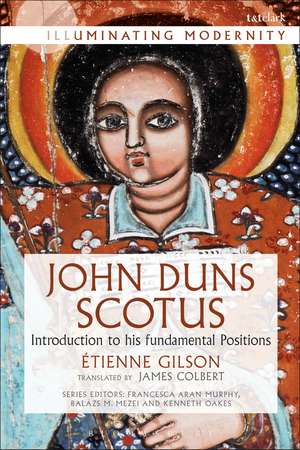John Duns Scotus: Introduction to His Fundamental Positions: Illuminating Modernity
Traducere de Dr James Colbert Autor Etienne Gilsonen Limba Engleză Paperback – 24 iun 2020
| Toate formatele și edițiile | Preț | Express |
|---|---|---|
| Paperback (1) | 234.86 lei 6-8 săpt. | |
| Bloomsbury Publishing – 24 iun 2020 | 234.86 lei 6-8 săpt. | |
| Hardback (1) | 1016.51 lei 6-8 săpt. | |
| Bloomsbury Publishing – 26 dec 2018 | 1016.51 lei 6-8 săpt. |
Preț: 234.86 lei
Preț vechi: 294.16 lei
-20% Nou
Puncte Express: 352
Preț estimativ în valută:
44.95€ • 46.75$ • 37.11£
44.95€ • 46.75$ • 37.11£
Carte tipărită la comandă
Livrare economică 12-26 aprilie
Preluare comenzi: 021 569.72.76
Specificații
ISBN-13: 9780567695253
ISBN-10: 0567695255
Pagini: 632
Dimensiuni: 156 x 234 x 36 mm
Greutate: 0.87 kg
Editura: Bloomsbury Publishing
Colecția T&T Clark
Seria Illuminating Modernity
Locul publicării:London, United Kingdom
ISBN-10: 0567695255
Pagini: 632
Dimensiuni: 156 x 234 x 36 mm
Greutate: 0.87 kg
Editura: Bloomsbury Publishing
Colecția T&T Clark
Seria Illuminating Modernity
Locul publicării:London, United Kingdom
Caracteristici
John Duns Scotus is arguably one of the most significant philosopher theologians of the Middle Ages
Notă biografică
Étienne Gilson (1884-1978) was a French philosopher and historian of philosophy.James Colbert is an Emeritus Professor of Philosophy at Fitchburg State University, USA. He has published translations from French, Spanish, and Italian.
Cuprins
ForewordTranslator's PrefacePrefaceChapter 1: The Object of MetaphysicsChapter 2: The Existence of Infinite BeingChapter 3: The Divine NatureChapter 4: Origin of the ContingentChapter 5: Angels Chapter 6: MatterChapter 7: The Human SoulChapter 8: Intellectual KnowledgeChapter 9: The WillChapter 10: Duns Scotus and the PhilosophersAppendices A, Bibliographical Information B, Biographical Information C. Alphabetum ScotiAfterword: The Dissolution of Divine Government: Gilson and the 'Scotus Story'BibliographyIndex of NamesIndex of Terms
Recenzii
This classic book offers a way of understanding Scotus, as well as contemporary interpretations of Scotus. In his Preface, Gilson cautions that 'it is always imprudent to extract in Scotus's name consequences that he has not deduced.' The timeliness of this warning--which henceforth I intend to heed--makes clear the importance of this translation.
At long last we have a highly readable translation of Étienne Gilson's Jean Duns Scot. This book is utterly indispensable for three reasons. First, it offers a lucid introduction to the most important medieval thinker after Aquinas; secondly, it illuminates the thought of the most prominent mediaevalist of the 20th century; and thirdly, John Milbank's interpretative Afterword is a genuine masterclass in its own right.
Why translate into English today a six hundred eighty-page history of a medieval author's treatment of diverse metaphysical issues, published in French back in 1952? Probably for many of the same reasons that this work was translated into Italian only in 2007. Gilson's original Preface and the translator's Appendices provide the perspective to see the worth of translating the mammoth text: together they all offer an invitation to pursue today a deeper understanding of Scotus's collection of metaphysical themes.
.Colbert delivers to English readers a translation of a difficult and expansive book. This translation is not only lucidly rendered, as well as faithful to Gilson; it is also a deeply learned volume. Colbert distinguishes this translation throughout by profound immersion in the complex theology and philosophy of Duns Scots-and of medieval scholastic thought in general. For the herculean effort, assiduity, and deep erudition that this volume required, [.] readers of Gilson and of Scotus, as well as historian of medieval Christian history and thought, owe Colbert their enthusiasm and gratitude.
At long last we have a highly readable translation of Étienne Gilson's Jean Duns Scot. This book is utterly indispensable for three reasons. First, it offers a lucid introduction to the most important medieval thinker after Aquinas; secondly, it illuminates the thought of the most prominent mediaevalist of the 20th century; and thirdly, John Milbank's interpretative Afterword is a genuine masterclass in its own right.
Why translate into English today a six hundred eighty-page history of a medieval author's treatment of diverse metaphysical issues, published in French back in 1952? Probably for many of the same reasons that this work was translated into Italian only in 2007. Gilson's original Preface and the translator's Appendices provide the perspective to see the worth of translating the mammoth text: together they all offer an invitation to pursue today a deeper understanding of Scotus's collection of metaphysical themes.
.Colbert delivers to English readers a translation of a difficult and expansive book. This translation is not only lucidly rendered, as well as faithful to Gilson; it is also a deeply learned volume. Colbert distinguishes this translation throughout by profound immersion in the complex theology and philosophy of Duns Scots-and of medieval scholastic thought in general. For the herculean effort, assiduity, and deep erudition that this volume required, [.] readers of Gilson and of Scotus, as well as historian of medieval Christian history and thought, owe Colbert their enthusiasm and gratitude.






